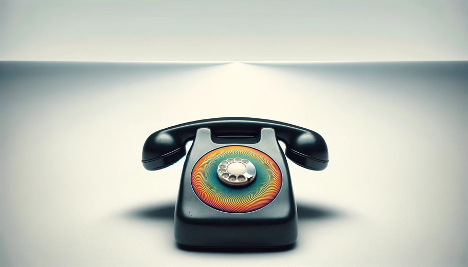
The Old Will Become New Again (Why The Future Won't Suck)
Posted April 24, 2024
Chris Campbell
Tech has never been more advanced, right?
Your Tesla can practically drive itself. You've got a supercomputer in your pocket controlling your smart home.
Everywhere you look, it's ones and zeros as far as the eye can see.
But here's the harsh truth -- our amazing technologies have made everything STUPIDLY COMPLEX and ENERGY-INEFFICIENT.
Sure…
We’re doing more stuff with less stuff, but we’re also layering more complexity, providing more ways for things to go wrong.
Just look at your new car…
That miraculous machine is a rat's nest of sensors, electronics, and computing power. All that digital wizardry costs you in more ways than you realize.
It's an energy suck constantly converting the real analog world into digestible digital code. Not to mention a repair nightmare when inevitably something goes haywire in the labyrinth.
Your car's battery gets drained by literally hundreds of digital systems idling in the background, awaiting your voice command or monitoring for faults. It's a massively over-engineered solution for what could be streamlined exponentially.
And it's not just cars -- it's our whole surrounding world of smart everything. We're addicted to jamming digital into every nook and cranny, hacking the real world into a crude digitized approximation of itself.
BUT
A revolution is coming… a return to our tech roots.
An analog renaissance.
No, not like an abacus or a sundial. I'm talking about advanced analog processors that compute with waves instead of ones and zeros.
And it could be BIG.
Why Analog… Why Now
The first thing you need to know:
Digital computers solve problems in a fundamentally different way from analog computers. That’s led to pretty cool stuff, but the cost is higher than Snoop Dogg during Sunday service.
Data scientist Alex de Vries estimates that a single interaction with an LLM -- such as typing a question in ChatGPT -- could consume as much power as leaving an LED lightbulb on for an hour.
Thing is, analog is more efficient for many of the things we’re shoehorning digital into to perform.
I’ll explain it this way:
Imagine you're trying to understand and work with the real world around you, like the temperature outside or the sound of your voice.
Now, if you use something called analog processors -- using waves and flows -- it's like speaking the same language as the world itself.
Instead of forcing the world into rigid bits, analog processors can seamlessly interface with continuous real-world signals -- the native tongues of energy and matter.
I know what you’re thinking:
If analog is so great, then why did digital kill the analog star?
Great question.
Moore’s Law
Analog computing was pushed aside in favor of digital computing because digital technology allowed for the creation of smaller, faster, and cheaper chips.
This was possible due to advances in semiconductor technology, which followed Moore's Law, a prediction that the number of transistors on a chip would double approximately every two years, leading to continual improvements in digital computers.
You’ve heard this one before: The latest iPhone contains a processor that runs above 3 gigahertz. The Apollo Guidance Computer aboard the Apollo ran at less than 0.05 megahertz. The processing speed of the latest iPhone's processor is approximately 5,999,900% greater than that of the Apollo Guidance Computer.
BUT
As we continue to improve digital technology, each new improvement offers less benefit compared to the past -- the law of diminishing returns.
Even though we keep investing more effort and resources into making chips smaller and faster, the gains from those investments are becoming smaller.
There are physical and practical limits to how much we can keep enhancing this technology. Gordon Moore, creator of Moore’s Law, said this in 2005: “The fact that materials are made of atoms is the fundamental limitation and it’s not that far away.”
As a result, digital computing is becoming incredibly energy-intensive, especially for AI and machine learning workloads.
It requires more power to handle complex computations as technology tries to do more in smaller spaces.
(Not to mention, the heat becomes a big problem the smaller these things get.)
On the other hand, analog computing doesn't face these energy issues -- at least not as severe. In fact, analog spin-wave computers don’t heat up to dangerous levels, therefore don’t need expensive ways to keep them cool.
Hence…
Analog Has Unique Strengths We Can’t Ignore
Analog is particularly good at tasks that involve modeling and solving equations that describe real-world physical phenomena.
Digital computing, however, is better suited for different types of tasks that require precise calculations and handling large amounts of data.
Each type of computing excels in different areas.
Both will be important in the future. But right now, we’re heavily weighted to the digital.
Think about all the smart devices and sensors in your life constantly digitizing analog inputs like sound, motion, etc.
It's a HUGE energy suck.
With analog processors, all that waste goes away. We're talking potentially 1000x more efficient for certain applications.
Analog circuits can be used to accelerate certain types of AI algorithms. They can perform certain operations more efficiently than digital counterparts, leading to lower power consumption and faster processing.
Analog circuits can also be used in power management systems to optimize energy usage and improve efficiency. For example, analog voltage regulators can provide smooth, continuous power control with lower power losses compared to digital switching regulators.
And of course, being software-programmable, device makers can keep upgrading and future-proofing these analog chips just like they do regular processors.
It’s time for the pendulum to correct itself back to analog.
The future is hybrid. In fact, rumor on the streets is that tech companies are catching on and creating these chips in secret.
What does this mean? What are the benefits? Could technology become more private? How to invest?
All that and more tomorrow.
